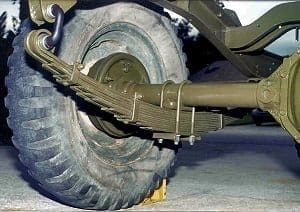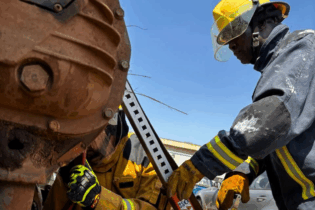Leaf spring suspension has been around for almost as long as the truck itself and remains, by some way, the most widely used truck trailer suspension type in use today.
For general purpose applications, leaf spring suspension is hard to beat as it provides a smooth enough ride for most applications while costing a fraction of the price of air suspension. It is also easier to maintain throughout its lifecycle. It is an ideal solution in the remoteness of Africa, where a basic workshop is all that is usually required to repair or replace broken parts. In Europe, leaf spring suspension fell out of favour due to its harshness, while some claimed its use damaged roads. Research has since disproved this claim and its popularity has subsequently improved. Polyflex Urethanes’ Fred Evans says much has changed since the early 2000s when air suspension gained popularity in developed markets. Moving tons“The brakes were applied to the world’s economy in the middle part of the last decade and, as a result, logisticians were forced to take a long hard look at what was really required from their transport operations. They began to examine the freight they carried and diagnosed possible areas of concern for damage or losses as a result of it being moved,” he says. “Typically, heavy freight is shipped by sea or rail and makes its way onto the highway for a comparatively short space of its journey. After battling through the waves on the decks of ships and clattering along on the metal-to-metal rail journeys, it became abundantly clear that the highway leg of the journey would be far kinder to the freight – no matter what suspension was used. “So long as the truck trailer was correctly setup, with the right tyre pressures and properly serviced suspension, the chances of damage occurring on ordinary freight was deemed to be negligible. Air suspension fleets are slowly being phased out in favour, once again, of the trustworthy leaf spring suspension.”
Lower costs
Other important considerations were also examined, including the overall cost of ownership and the cost per kilometre. From the outset, air suspension is far more costly to purchase. Thereafter, the maintenance cost of air suspension increases considerably, especially after the third year of the trailer’s life. Monthly checks form part of the maintenance routine, with many in hard to see / access areas.
“There is scant evidence that suspension type plays a role in fuel consumption or road damage and it is not inconceivable that a fully laden rig, with over inflated tyres, would do more damage than a truck with properly inflated tyres and stiff suspension. The rolling resistance of a truck trailer with either air or spring suspension should remain the same, as long as either is properly setup. “Air suspension comes into its own when transporting sensitive cargo, where adjustable heights are required or with special applications. If the return leg of a journey is undertaken with an empty trailer on bumpy roads where no ballast can be added, then it may be worthwhile to purchase an air suspension trailer to avoid excessive bouncing. “But, in my experience in dealing with and providing service parts for trailers over the past 30 years, there is very little reason to buy air suspension as it is an additional cost that does not make the operator a single cent. In fact, it costs far more in capital expenditure, is more costly to maintain and repair in the event of damage,” Evans concludes.







